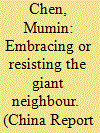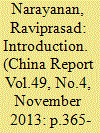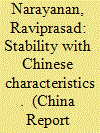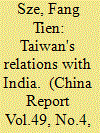|
|
|
Sort Order |
|
|
|
Items / Page
|
|
|
|
|
|
|
| Srl | Item |
| 1 |
ID:
126620


|
|
|
|
|
| Publication |
2013.
|
| Summary/Abstract |
Maritime territorial disputes have become a hot issue in regional security and a pressing issue for Taiwan's national security. While Taiwan is persistently claiming sovereign right over the large part of the South China Sea based on the U-shaped line, its role is however weakened as a result of the cross-strait hostility and its prolonged hands-off policy. Of course, its ambiguous international status, difficult relation with mainland China and domestic political confusion on nation's future have more to do with its inactive role in the South China Sea disputes. This insecurity contributes to its ambivalent policy. This articleintends to address Taiwan's legitimate claim for the part of the South China Sea, which has been unknown and neglected by the international community, and examine the reasons why Taiwan had taken inactive policy toward the South China Sea. Alerted by recent aggressive moves of other claimants, Taiwan is now shifting to a reasonable tougher strategy in the South China Sea. The articlealso projects the course of fresh efforts made by the Taiwan government pressurised by the public with increasing awareness of urgency.
|
|
|
|
|
|
|
|
|
|
|
|
|
|
|
|
| 2 |
ID:
126629


|
|
|
|
|
| Publication |
2013.
|
| Summary/Abstract |
Since 2008, President Ma Ying-jeou and his Kuomintang (KMT) government in Taiwan have adopted the policy of seeking greater economic cooperation with China in exchange of reducing confrontation across the Taiwan Strait. By endorsing the 'One China' principle, the KMT government successfully resumed dialogue with Beijing and signed 18 agreements, ranging from allowing Chinese tourists to visit Taiwan to establishing a closer economic partnership. Yet President Ma's self-claimed achievements in cross-strait peace received severe criticisms from the opposition Democratic Progressive Party (DPP), which accused KMT's pro-China policy as selling out the democratic Taiwan to an authoritarian regime. This article examines the on-going debates between the ruling KMT and opposition DPP about proper strategies towards China, and how such debates make it unlikely for Taiwan to form an effective policy on cross-strait affairs. The differences between KMT and DPP on their respective China policies have led to prolonged distrust between both parties, and between DPP and Beijing. Facing an increasingly powerful China, both parties are short of better ideas to convince voters that their current policy will effectively secure Taiwan's sovereign status or will be beneficial to enhancing Taiwan's interests in the long term.
|
|
|
|
|
|
|
|
|
|
|
|
|
|
|
|
| 3 |
ID:
126595


|
|
|
|
|
| Publication |
2013.
|
| Summary/Abstract |
It is not often that one comes across academic opinions from Taiwan on issues local and global. This special issue of the China Report titled 'Taiwanese Engagement with the Indo-Pacific' details perceptions of leading scholars from reputed universities and think-tanks in Taiwan on strategic and security issues faced by the island. The discourse on Taiwan's need for security in a constantly changing world is an intensive and engaging arena that throws up voluble insights into the pace, depth, variety and intensity of Cross-Strait relations, engagement with the United States, policy on South China Sea disputes, contestations of external policy in the internal political sphere and relations with other stakeholders of the international system including India.
|
|
|
|
|
|
|
|
|
|
|
|
|
|
|
|
| 4 |
ID:
126632


|
|
|
|
|
| Publication |
2013.
|
| Summary/Abstract |
Even as Xi Jinping begins to make his personal imprint on Cross-Strait relations, he has to contend with his predecessor, Hu Jintao's policy towards Taiwan that generated a modus vivendi, acting as a precursor to a slew of trade related agreements between the two sides leading to the ECFA in 2010. On Taiwan, the 'status quo' aspect of Cross-Strait relations has assumed overwhelming consensus with calls for deeper economic engagement with the mainland. Broadly, a template with its own characteristics emerges of a selective reconciling of differences with certain accommodations of interests making the Cross-Strait relations a unique model. This article situates Cross-Strait relations during Hu Jintao's term from 2002-2012, and advances the proposition that the mechanics of an eventual integration are underway with deeper economic cooperation being the first phase of a comprehensive framework under construction. To Beijing, its behaviour on Cross-Strait issues is intrinsic to its announced process of 'peaceful development'. However, the 'relative' success of the on-going process of economic integration does not have to be interpreted as an overwhelming endorsement of the methodology adopted, since closer relations with the mainland is a deeply divisive and politically charged issue in Taiwan
|
|
|
|
|
|
|
|
|
|
|
|
|
|
|
|
| 5 |
ID:
126634


|
|
|
|
|
| Publication |
2013.
|
| Summary/Abstract |
India's rise' has been the main driver of the India-Taiwan relationship over the recent years. Acknowledging India's growing profile and influence in international society in the early 2000s, Taiwan has shown greater willingness to team up with India. As a result, Taiwan favours a more engagement-based policy toward India. Treating 'India's rise' as the main factor, this article tries to provide a new perspective for understanding India-Taiwan relations. For this purpose, the article will address the development of the relationship, looking specifically at the economic, trade and strategic cooperation as well as educational and academic exchanges. This article concludes that the two sides are poised for constructive engagement but need to establish a long-term framework for realising the full potential.
|
|
|
|
|
|
|
|
|
|
|
|
|
|
|
|
| 6 |
ID:
126614


|
|
|
|
|
| Publication |
2013.
|
| Summary/Abstract |
Taiwan's engagement with China has complicated its relations with the United States, even though Washington supports Taipei's engagement policy. Various American domestic actors are suspicious of Taiwan's new relations with China and raise their concerns. Some question Taiwan's loyalty and consistency, and some call for change of American policy toward Taiwan including arms sales. They are also displeased with Taiwan's actions on the Diaoyutai Islands disputes. Indeed, it is extremely difficult for a small power like Taiwan to manage the relations with two great powers, especially when they are in competition. The purpose of the article is to analyse how Taiwan keeps up its traditional ties with the United States and attempts to deal with the issues raised by the uncertainties in the relationship
|
|
|
|
|
|
|
|
|
|
|
|
|
|
|
|
|
|
|
|
|